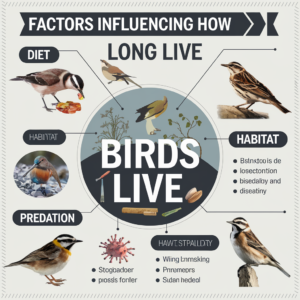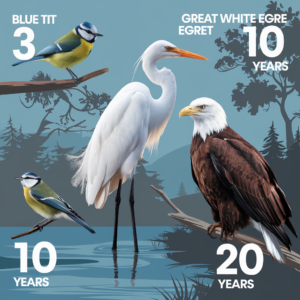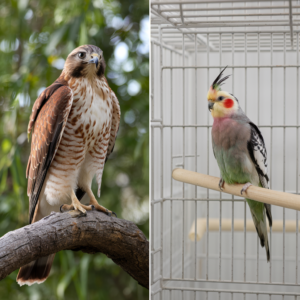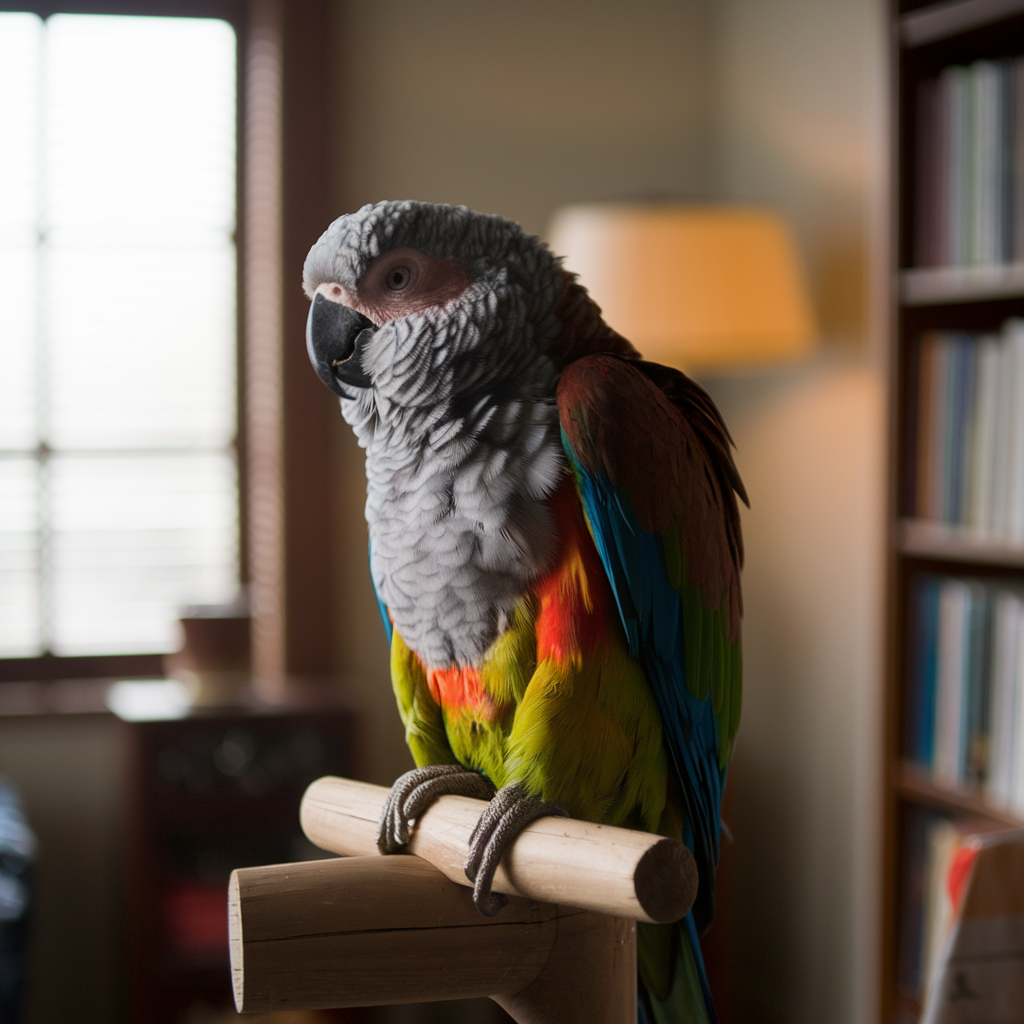Birds are fascinating creatures with a wide variety of lifespans. From tiny hummingbirds to giant eagles, birds can live anywhere from a few years to several decades, depending on their species, environment, and lifestyle. If you’ve ever wondered, “How long do birds live?” This guide will delve deep into the factors that affect bird lifespan, the average Life Span of different bird species, and how to increase the longevity of pet birds.
Factors Influencing How Long Birds Live
Bird lifespan is influenced by various factors that can either lengthen or shorten their life expectancy. These factors include:

Species
The species of a bird is the most significant determinant of its Lifespan. Larger birds, such as parrots and eagles, generally live longer than smaller species like sparrows or finches. In the wild, these larger birds are often apex predators, reducing their risk of being preyed upon and contributing to their longevity.
Environment
Birds in the wild face numerous threats, including predators, harsh weather conditions, food scarcity, and diseases. Birds living in captivity, such as those in zoos or as pets, often live longer because they have consistent access to food, medical care, and protection from predators.
Dietary and Health Factors Affecting How Long Birds Live
A well-balanced diet can significantly extend a bird’s life. Wild birds that feed on a natural diet of seeds, fruits, insects, and other organic materials tend to have a robust immune system. In contrast, pet birds fed a poor or imbalanced diet might develop health problems that shorten their Lifespan.
Fun Fact: According to research by the National Audubon Society, providing a diverse diet rich in fruits and proteins can add several years to a bird’s Lifespan.
Predation and Threats
Birds that live in environments with fewer predators or less human interference generally live longer. Urban environments, for example, often present birds with additional threats like vehicles, pollution, and domestic animals, which can reduce their longevity.
Reproductive Patterns
Interestingly, birds that breed frequently often have shorter lifespans. This is because reproduction can take a toll on their bodies, requiring significant energy for mating, nesting, and rearing their young. In contrast, birds with slower reproductive rates, such as some parrots, tend to live longer.
Various factors influence a bird’s lifespan, which can either lengthen or shorten it. For a more detailed understanding of these factors, visit the Cornell Lab of Ornithology, which offers extensive resources on bird species, their behaviors, and environmental impacts on their longevity.
How Long Do Different Bird Species Live?

Birds have varying lifespans depending on their species. Here’s an overview of short-lived, medium-lived, and long-lived bird species, broken down for easy reference:
Short-Lived Birds
Some bird species are known to have shorter lifespans, often due to their small size and high metabolic rates.
| Species | Average Lifespan in the Wild | Average Lifespan in Captivity |
|---|---|---|
| House Sparrow | 3-5 years | 7-10 years |
| Hummingbird | 3-5 years | 5-10 years |
| Finch | 2-5 years | 7-10 years |
Critical Insight: Smaller birds have shorter lifespans due to their fast-paced lives. Their high metabolism means they burn energy quickly, which can contribute to their shorter lifespans.
Medium-Lived Birds
Medium-sized birds tend to have moderate lifespans, often between 10 and 20 years.
| Species | Average Lifespan in the Wild | Average Lifespan in Captivity |
|---|---|---|
| Robin | 5-10 years | 10-12 years |
| Pigeon | 6-10 years | 15-20 years |
| Cockatiel | 10-15 years | 20-25 years |
Fact: Cockatiels, a famous pet bird, can live over two decades in captivity when provided with the proper care and environment.
Long-Lived Birds
Larger birds, particularly parrots and birds of prey, can live for many decades, sometimes outliving their human owners.
| Species | Average Lifespan in the Wild | Average Lifespan in Captivity |
|---|---|---|
| African Grey Parrot | 30-50 years | 40-60 years |
| Bald Eagle | 20-30 years | 40-50 years |
| Macaw | 30-50 years | 50-70 years |
Fun Fact: Some species of parrots, like the Macaw, can live up to 70 years in captivity, making them lifelong companions. Read this bird longing for more information.
Wild Birds vs. Captive Birds: A Lifespan Comparison

Wild birds face numerous challenges in their natural habitats, so a global perspective on bird conservation efforts is needed. Predation, food scarcity, diseases, and environmental changes are just a few factors that impact their Lifespan. In contrast, captive birds are protected from these threats, often living significantly longer due to:
- Controlled Diet: Pet and zoo birds receive a balanced diet that meets their nutritional needs, preventing malnutrition or starvation.
- Medical Care: Regular vet checkups and vaccinations keep captive birds healthy.
- Safety from Predators: Without natural predators, captive birds are safe from many of the dangers that shorten wild birds’ lives.
| Condition | Wild Birds | Captive Birds |
|---|---|---|
| Average Lifespan | Shorter (varies by species) | Longer (up to twice as long) |
| Diet | Variable, dependent on availability | Controlled and balanced |
| Threats | Predation, diseases, harsh weather | Minimal, with medical care |
Case Study: A World Parrot Trust study found that parrots live twice as long in captivity as their wild counterparts due to better care and fewer threats.
How to Increase the Lifespan of Pet Birds
For those with pet birds, there are several strategies to help them live longer, healthier lives:
Provide a Nutritious Diet
A balanced diet rich in seeds, fruits, vegetables, and specially formulated bird pellets is essential. Avoid feeding birds toxic foods such as chocolate, avocado, or caffeine.
Creating a Safe Environment to Increase Bird Lifespan
Birds, especially parrots, need mental stimulation to prevent boredom. Toys, social interaction, and regular exercise can keep them mentally and physically fit.
Regular Health Checkups
Schedule routine vet visits to check for common bird diseases and ensure your pet is healthy. Early detection of issues like respiratory infections or malnutrition can prevent long-term problems.
Proper Housing
Ensure the bird’s cage is large enough for flight and movement. Clean the cage regularly and provide fresh water daily.
Tip: Interaction with their owner can also contribute to parrots’ longevity. Socially engaging with your birds can help keep them happy and healthy.
Case Studies: Longest Living Birds
Several birds have set records for longevity, showcasing the potential Lifespan of well-cared-for birds.
Charlie, the Blue Macaw
Charlie, a Blue Macaw, lived to 83, one of the longest-living birds ever recorded. Owned by Winston Churchill, Charlie lived most of his life in captivity, enjoying a varied diet and constant companionship.
Cookie, the Cockatoo
Cookie, a Major Mitchell’s Cockatoo, lived to the age of 83 in captivity at the Brookfield Zoo in Chicago. Cookie’s long life was attributed to excellent care and a stable environment.
Wisdom, the Albatross
Wisdom, a Laysan Albatross, is currently the oldest known wild bird, at over 70 years old. She continues to breed and raise chicks, defying the odds for a wild bird.
FAQs
What is the longest a bird has ever lived?
The oldest known bird in captivity was a cockatoo named Cookie, who lived for 83 years.
Do larger birds live longer than smaller birds?
Yes, larger bird species tend to live longer than smaller ones. For example, parrots can live up to 70 years, while small finches may only live 5 years.
Why do wild birds have shorter lifespans than captive birds?
Wild birds face numerous challenges, such as predators, diseases, and food scarcity, which can shorten their lifespans. Captive birds have access to regular food and medical care.
Conclusion:
Understanding birdLifespanpans can provide valuable insights into their care and conservation. While the lifesLifespanirds varies significantly by species, environmental conditions, and care, providing a balanced diet, a safe and enriching environment, and regular health checkups can enhance the longevity of pet birds.
Each bird species has its unique lifespan and requirements, from short-lived house sparrows to lifespan-spanning macaws. By recognizing these differences and adapting our care practices, we can ensure that our avian friends lead longer, healthier lives. Whether you’re a bird enthusiast, a pet owner, or simply curious about avian life, knowing how long birds live and what affects their longevity can deepen your appreciation for these remarkable creatures.
You might also find our article on How Do Birds Reproduce helpful.

